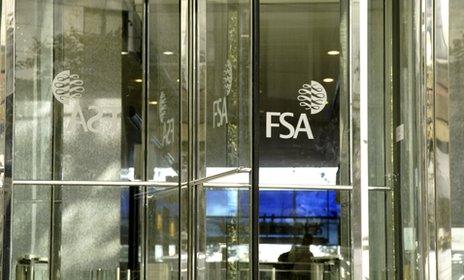Why did regulator ignore Co-op Bank's financial experts?
- Published
- comments

Regulators' defence against the charge that they should never have permitted Rev Paul Flowers to become chairman of Co-op Bank in 2010, on the basis that he had almost no relevant financial or commercial experience, is that they forced Co-op Bank to surround Flowers with a couple of financially experienced deputy chairmen (see the latter part of an earlier post).
And for the avoidance of doubt, that is what both the Financial Conduct Authority and the Prudential Regulation Authority have said to me - they are the successor bodies to the Financial Services Authority, which was the regulator of the time, and they continue to employ most of the people who previously worked for the FSA.
In the event, Co-op Bank appointed David Davies, a former chief executive of Pearl Assurance, and Rodney Baker-Bates, ex chair of Britannia Building Society (which Co-op Bank merged with in 2009) and a former senior executive of the Pru and the BBC, to the deputy chair posts.
Now here's the bloomin' odd thing.
If their appointments were so materially important to the FSA, you would have expected the regulators to pay especially close attention to their views on all materially important events at Co-op Bank.
But that does not appear to have happened, in respect of the most materially important ambition of the Co-op Bank in recent years, which was to acquire more than 600 branches from Lloyds and more than double in size.
The important point is that both Davies and Baker-Bates were against this takeover. They felt that Co-op Bank was biting off more than it could possibly safely chew.
According to a source, Davies and Baker-Bates were "trenchant in their opposition to the transaction for months".
They manifested their opposition to the deal in a formal way - they voted against the takeover just days before Co-op Group was announced as the preferred bidder for the Lloyds branches in July 2012.
As you may have deduced, Davies and Baker-Bates were outvoted on the Co-op Bank board. And the board of Co-op Bank's owner, Co-op Group, which had the ultimate power to decide whether to do the deal, voted for the deal too.
That is why the deal with Lloyds was duly announced as going ahead on 19 July 2012.
So here is the question. If it was so important to the FSA for Baker-Bates and Davies to be appointed, why on earth did the regulator not take heed of their opposition to the takeover of Lloyds' branches?
Why did the FSA allow Co-op Bank to continue deploying large amounts of time and money, for another nine months, on trying to execute this massive - and many would say foolhardy - expansion plan (it would not be till the end of April 2013 that Co-op Bank dropped the takeover).
And it is not just that the FSA's two experts on the board voted against the deal. One of them, Baker-Bates, actually decided to quit the bank board, largely because - I am told - he was opposed to the Lloyds' deal.
Now regulators tell me that Baker-Bates left the Co-op Bank board as part of a restructuring of the board, when it required Co-op Bank to reduce board numbers.
But if that's so, it seems a bit bonkers - because although large boards are often unwieldy, slimming down the Co-op Bank board by seeing the departure of that rarest of things, a board member who understood banking, would seem very odd.
Anyway I understand that Baker-Bates explained his concerns about how the takeover was seriously undermining management resources in his formal exit interview with the FSA in September 2012 - some eight months before the deal collapsed.
Now regulators' position on all this is that they could not have formally overturned a commercial decision by Co-op Group and Co-op Bank to do the Lloyds deal. So to that extent, it does not matter whether Davies and Baker-Bates were opposed to it and supposedly more expert than other board members.
But if that's so, why bother to have them appointed in the first place?
That said, regulators insist that they set strict conditions for doing the deal, which Co-op Bank never met (and see this previous post).
And they would also point out that the takeover never actually happened.
But the fact that the deal collapsed does not demonstrate that no harm was done.
We now know that Co-op Bank was very poorly managed from 2010 through to 2013. And that poor management led to massive wasted expenditure on an ambitious IT project and a failure to keep tabs on billions of pounds of loans that were going bad.
Management was over-stretched even without the distraction of trying to almost treble in size via the takeover. The attempted deal with Lloyds meant the process of strengthening a weakened bank was holed - and by the summer of this year, Co-op Bank was on the brink of collapse (as you know, we are now at a critical stage in the bank's rescue).
So, here is the conundrum (again) - why would regulators insist on the appointment of two expert deputy chairmen if they were unable or unwilling to subsequently use these experts' opposition to a massive transaction as reason to nip that transaction in the bud?